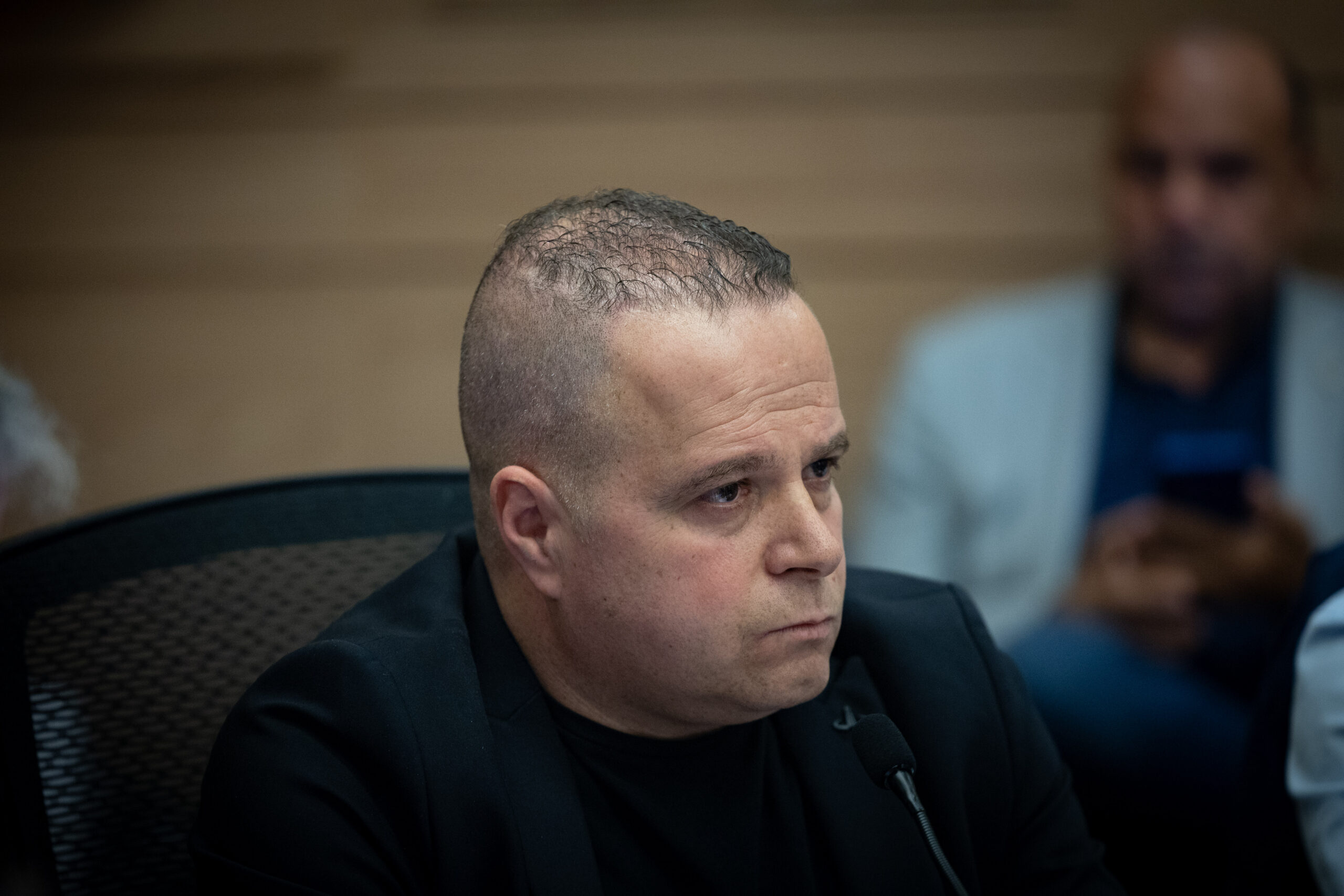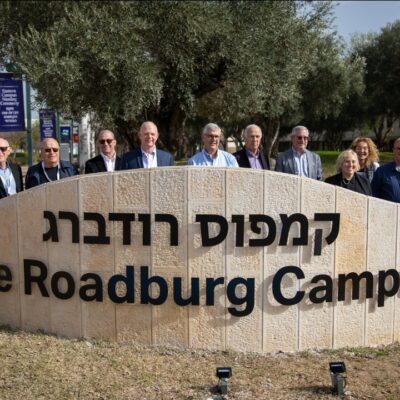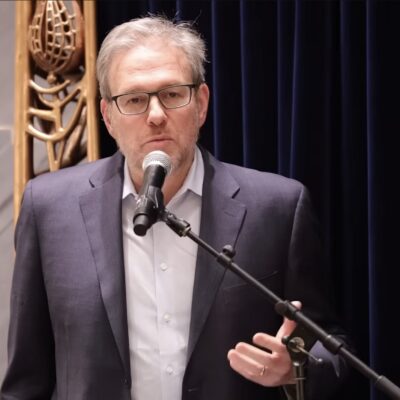Your Daily Phil: New push to train preschool teachers + Calif. budget cuts imperil security grants
Good Thursday morning!
In today’s edition of Your Daily Phil, we report on a new initiative by the JCC Association of North America, Jewish Federations of North America and the Union for Reform Judaism to address a shortage of early childhood educators in Jewish schools. We also feature an op-ed from Betsy Stone. We’ll start with concerns that California will cut funding to its nonprofit security grant program.
For the first time in years, the State of California faces at least a $22.5 billion budget shortfall due to inflation and poor stock market performance. The result is a budget proposal from Democratic Gov. Gavin Newsom that makes major cuts to some initiatives, including the state’s nonprofit security grant program – a source of major concern for local Jewish leaders, reports Gabby Deutch for eJewishPhilanthropy’s sister publication Jewish Insider.
The program provided almost $50 million in grants last year to help nonprofit organizations fund security expenses. If the program is not funded for the 2023-2024 year, it would mark a major reversal: In September, Newsom signed a bill pledging to keep the program going indefinitely, albeit subject to the annual appropriations process.
Jewish community members in California are gearing up for a significant advocacy fight to ensure that the funding gets added back to the budget — and they’re asking for more money than last year, citing rising antisemitism and other forms of hate.
“This is literally item No. 1 on our agenda,” California Assemblymember Jesse Gabriel, an Encino Democrat who chairs the Legislative Jewish Caucus, told JI. Legislators from the Jewish Caucus will meet with Newsom on Thursday to discuss the security funding. More than 300 Jewish activists will be in Sacramento next week for a lobbying summit focused on the security funding and other issues supported by the Jewish community such as Holocaust education and supporting refugees.
Only 38% of the organizations that applied for nonprofit security funding last year received it, according to data provided by the Jewish Public Affairs Committee of California, which advocates on behalf of the state’s Jewish federations.
“We’ve gotten indications from his advisers that there won’t be anything new added in May because of this budget shortfall, and that makes us deeply concerned,” said David Bocarsly, JPAC’s executive director.
Despite being lower than the $80 million that Jewish advocates had lobbied for, the nearly $50 million provided by the state was still among the highest in the nation, along with New York. California is home to the nation’s second-largest Jewish population after the Empire State. “Having no money in the budget is certainly worse than having some money in the budget,” said Bocarsly. “Why doesn’t he just offer a smaller amount? I don’t know.”
Read the full story here and sign up for Jewish Insider’s Daily Kickoff here.
Teach your children well

The JCC Association of North America, Jewish Federations of North America and the Union for Reform Judaism are preparing to launch a major new initiative to train hundreds of new early childhood Jewish educators in the coming years, filling two key positions ahead of the program’s launch this fall, reports eJewishPhilanthropy’s Judah Ari Gross.
30 years’ experience: Orna Siegel, currently the director of enrollment at the Charles E. Smith Jewish Day School in Rockville, Md., will serve as the inaugural executive director of the nationwide program. And Sasha Kopp, an early childhood and family engagement consultant at The Jewish Education Project, was named the senior director of education and engagement. Siegel and Kopp, who have more than 20 and 10 years of experience in Jewish education, respectively, will begin their new roles on June 5.
Addressing a need: Project-412, which was first initiated in 2019, will launch a three-year pilot program in 14 communities across the country in September that will recruit, train and help give credentials to 30 educators in each participating community – 420 educators in total. This is meant to at least begin to address a national “critical shortage of qualified early childhood educators” in Jewish schools, according to the JCCA.
Lessons of the fathers: The $12 million program goes by the working title of Project-412, a reference to a passage from Pirkei Avot 4:12 about education, though this is likely to change before the official launch in September. The majority of the initial funding for the program, $8.5 million of the $12 million was donated by the Jim Joseph Foundation, Crown Family Philanthropies and the Samuels Family Foundation. The remaining $3.5 million will be raised by the 14 participating communities by 2025.
An extra set of hands: While Kopp said the shortage of early childhood educators is acute and readily apparent, it is difficult to give a concrete number of how many educators are needed due to high turnover rates of staff in schools. “By investing in our schools and by having more staff, that allows our educators to be creative. If they have an extra set of hands, that means teachers can have time to plan. They can write parent-teacher conference reports. They can examine students’ artwork and create more emergent in-depth curricula that focus on children’s curiosity,” Kopp told eJP. “Right now, there’s not enough staff in our classrooms who are able to do that super level of education.”
The key to engagement: According to Kopp, who has been involved in the development of Project-412 since 2019, the initiative is meant to have a wide impact, to not only address the immediate educational needs of the children involved but to also set them up for further Jewish education in later years and to increase the significance of Judaism for the entire family. “I really believe that Jewish early childhood education is the key to later Jewish engagement,” she said.
Fixing the bottleneck: Siegel, whose background is more in the field of Jewish day schools, similarly said that she saw focusing on early childhood education as a way to have an impact on larger Jewish communal issues. “I’m interested in the question of Jewish vitality in all sectors, and I have a strong belief that education is the way to act,” Siegel told eJP. “The reason I think this is so exciting is because it’s taking a very large problem of Jewish engagement globally, and saying, ‘Where’s the bottleneck?’”
Crisis of purpose
Is anyone ever coming back into the pews?

“In my work with clergy of various faiths, I hear a lot of complaints that people aren’t returning to worship services. There is fear that this will hasten the decline of organized religion, destabilize the finances of institutions, lead to job losses and diminished morale,” writes psychologist Betsy Stone, in an opinion piece for eJewishPhilanthropy.
Seders drew congregants: “In many congregations this year, there were huge crowds for congregational seders. Why do people come to the seder and not to services? Do they show up for social events, but eschew Kabbalat Shabbat? How can we understand the meaning behind the behavior? And can we adapt?”
Reevaluating our lives: ‘Many clergy are now facing a crisis of purpose. They ask themselves who and what they are, as congregants ask themselves what function religion plays in their lives. This doesn’t surprise me – the crisis of COVID and its concomitant losses have made many of us evaluate our lives. Purpose changes over our lifetimes, in response to loss, age, opportunity. What purpose is served by our shuls, our JCCs, our legacy institutions today?”
Worthy Reads
The House of God: In The Chronicle of Philanthropy, Eden Stiffman profiles an innovative solution that religious congregations are taking to address the U.S. housing crisis. “Neighbors’ stories guided the [Arlington Presbyterian Church’s] radical transformation. As church members rode the bus and spoke with people who worked nearby, they heard a common concern: People were struggling to afford to live there… Ultimately — after some contentious discussions — the church reached a decision to do its part to help low- and middle-income people acquire housing using the greatest asset it had: valuable real estate. In 2016 the church sold its land and historic stone building with a green copper steeple to the Arlington Partnership for Affordable Housing, a nonprofit developer, for $8.5 million. The church was razed, and in its place now stands Gilliam Place, a six-story complex with 173 apartments… Leaders from more than 250 houses of worship across the county have participated in… training sessions, and Black churches represent around 80 percent. The remaining 20 percent include a mix of predominantly white or culturally mixed churches and a few mosques and synagogues. ‘Part of our work is to get more faith communities from all kind of walks involved,’ [Rev. David Bowers, the vice president of a housing nonprofit,] says. ‘When you have declining memberships, and you see your building space very underutilized, it becomes pretty stark.’” [ChronicleofPhilanthropy]
Around the Web
Eighty Jewish organizations from across the political spectrum signed a letter calling on members of the American Anthropological Association to vote against a resolution to boycott Israeli academic institutions…
Dutch Rabbi Binyomin Jacobs fumed after dozens of municipalities in The Netherlands decided to refuse to investigate cases of Dutch authorities illegally seizing Jewish property during the Holocaust…
The Israeli startup accelerator nonprofit MassChallenge IL launched its latest cohort of 49 young companies in Jerusalem…
Ohel Sarah, an Israeli nonprofit that works with children and adults with special needs, announced the creation of the Matanel Inclusive Employer Award, backed by funding from the Matanel Foundation, for Israeli companies that employ people with special needs…
Pic of the Day

Rachel Javit holds up an artist’s rendering of what will become the Rachel and Max Javit Medical Simulation and Classroom Building at Ben-Gurion University, alongside representatives from the institution, at the Toby & Leon Cooperman Sinai Residences in Boca Raton, Fla., earlier this week. The building will allow the university to expand its medical and health-care programs.
Birthdays

President of national expansion at Veterans Community Project, Jason Kander…
Former chairman and CEO of American International Group, now chairman and CEO of the Starr Companies, Maurice Raymond “Hank” Greenberg… Congregational rabbi, then executive director of the Texas A&M Hillel for 30 years, now a security consultant for the tourism industry, Peter E. Tarlow… Nonresident senior fellow at the Brookings Institution for climate change, he was previously the U.S. special envoy for climate change, Todd D. Stern… Executive director at Har Sinai Oheb Shalom Congregation in Baltimore, Lee Sherman… Partner at NYC-based Mintz & Gold, he was EVP and general counsel for both the Las Vegas Sands and News Corporation, Lawrence “Lon” A. Jacobs… Northern Virginia-based portrait artist, Ilisa G. Calderon… Member of the U.S. House of Representatives (D-VT), Rebecca A. “Becca” Balint… Triathlete and winner of international Ironman competitions, Joanna Sue Zeiger… Director of congregational education at NYC’s Park Avenue Synagogue, Bradley Solmsen… State attorney for Palm Beach County, Fla., first elected in 2012 and re-elected in 2016 and 2020, Dave Aronberg… Chair and director at NYC’s department of city planning, Daniel Garodnick… Mechal Wakslak… Managing director of food programs at NYC’s Met Council on Jewish Poverty, Jessica Chait… Tech entrepreneur, best known as a founder of both Vine and HQ Trivia, Rus Yusupov… VP at BerlinRosen, Allison Fran Bormel… Account executive at Crunchtime, Rebecca Leibowitz Wasserstrom… Production coordinator and assistant to the executive producer of ABC’s “General Hospital,” Steven A. Rosenberg… Speechwriter and senior advisor to the secretary of state, Shana Mansbach… Director of client services for ESG at Everfi, Sasha Altschuler… Actor best known for voicing the title character of the animated film “Finding Nemo,” Alexander Gould … Medalist in the women’s halfpipe event at the 2018 Winter Olympics in PyeongChang, South Korea, Arielle Townsend Gold… Consultant at The Boston Consulting Group, Olivia Breuer…


 Add EJP on Google
Add EJP on Google






